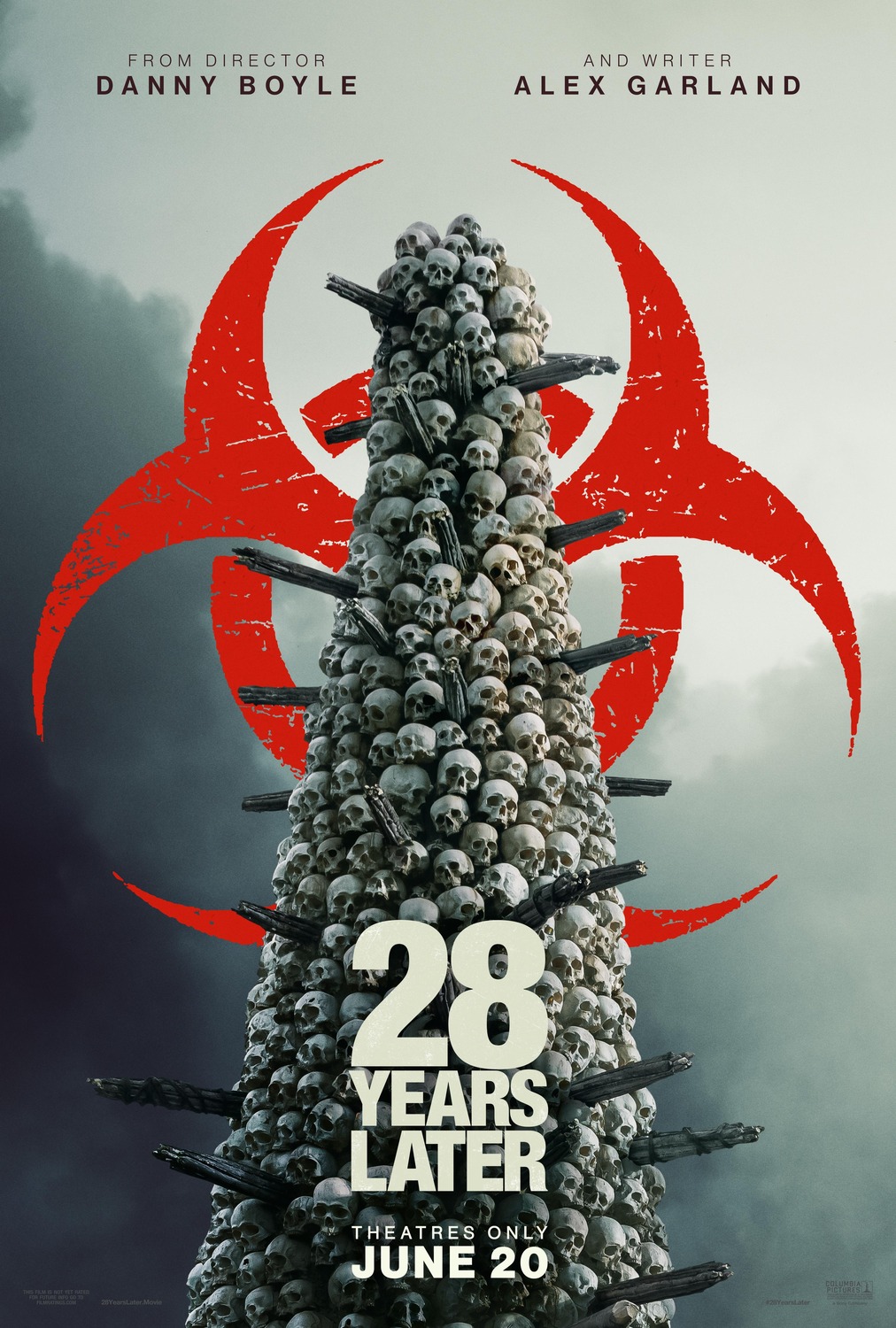Director
Danny Boyle
Starring
Alfie Williams
Aaron Taylor-Johnson
Jodie Comer
Ralph Fiennes
Nearly three decades after the rage virus outbreak seen in 28 Days Later, the British isles remain a quarantine zone, with those still alive left to fend for themselves. One such community in the North East of the country is a small island, separated from the mainland by a causeway protected by the strong tides. Life in this haven is simple but strict. The story opens with 12 year old Spike [Williams] being taken out on his first day to patrol the English forests, with his father, Jamie [Talyor-Johnson]. The experience is chaotic and traumatic but ultimately a success. But when Spike learns that there’s a doctor living among the infected, he ventures off to seek help for his sickly mother, Isla [Comer].
28 Days Later was a bold piece of filmmaking, taking the expertise and vision of the cast and crew, and essentially limiting it with rough-and-ready, handheld, grainy digital cameras to give the entire feature a more grounded and realistic feel. While its sequel, 28 Weeks Later was an interesting attempt with some standout moments, it failed to capture the oddball absurdity and claustrophobic reactionary tightness from the original. But with just over 20 years’ distance between the first film and this sequel, and the reuniting of the director and screenwriter, 28 Years Later feels primed to be something very special. And, in truth, it is.
The first thing to note is the care and consideration for logical world-building. All too often apocalyptic settings are wish fulfilment fantasies wrapped in fetishisms. But the stripped-back reality on display here deals with the simple fundamentals of survival. And with an earnest focus on the practicalities of surviving an apocalypse – concepts like clean water, washing, foraging, designing reusable weapons – are all given an almost artisanal deference. It’s only when Spike encounters a Swedish soldier that we see how the world at large carrying on unabated, with things like online deliveries and smartphones, would feel entirely alien to these people trying to survive.
For all the violence and gore, 28 Years Later is quite a contemplative piece. More interested in musing about life, death and the passage into adulthood. This is covered in not only the plot itself but the cutaways to newsreel footage and clips from mid 20th century films about English children being sent off to war. But more than the military comparison, there’s something primal and druidic running through the core of this movie. As if to infer that should the British isles revert back to a pre-Christian time, our practices would still be rooted in community but have a darker tone. Something akin to The Wicker Man. In fact, even the film’s structure, unfolding with layered vignettes, feels like a throwback to ancient prose or Viking sagas. Tales where the story of a young boy venturing with three different mentors (a father, a mother, and a wizard) across a mysterious and dangerous land, connecting with nature and performing acts of bravery, feels like the very thing of Arthurian myth and legend. And just when you have a handle on the situation, another revelation arrives and turns your expectations upside down.
All of which would be for nought if this film wasn’t headed by a phenomenally talented cast. Granted, it’s lean but every performance is standout. Comer plays a woman in the throes of illness magnificently, avoiding the pitfalls of “sick crazy mum” that lesser actors would dive head-first into. Taylor-Johnson is delightfully flawed, bringing a relatability to a reality distant from our own. And the shamanistic Ralph Fiennes is both nurturing and kind, but with a sheen of danger. Yes, a figure our hero can trust but to survive in the way he has, dictates he must be a brutally-minded person. And then you have young Alfie Williams going toe-to-toe with some of Britain’s finest. Everything that’s called upon for this young man, he delivers superbly.
As stated before, part of the reason 28 Days Later became so iconic and memorable, was down to its presentation. Zombies were a more than established adversary by 2002, but this new take, with erratically-spasming figures lunging, tearing and screaming made them beyond terrifying. So, what does that look like after multiple decades? Well, a combination of more of the same, and a few evolutions. The make-up continues to be marvellously simple and practical. Giving the new breed of rage infected creatures a more deadly edge. And this is captured in a contemporary equivalent to the early 2000s DV tapes – mobile phones. Albeit with very expensive lenses strapped to them. But this approach helps maintain the exceptionally gritty and visceral feeling. Especially when paired with the haunting sound design and aggressive, invasive industrial music.
***Unavoidable spoilers in this paragraph***
But for all its majesty, tension, and prowess, 28 Years Later makes a handful of creative decisions that will not only be jarring, but may completely put some audience members off. One of those choices is the quieter approach to the story. Yes, there is a solid amount of viscera, violence, mad scrambling, and narrow escapes, but they’re merely scattered points that sit on a bed of introspective tranquility and contemplation. For me, this is neither a negative, nor a real departure from the tone and pacing of the first movie. But some may consider it too slow. Then you have the childbirth scene. One that, on a thematic level, is genius. The concept of heading out from your home with your dying mother, only to return with a newborn, is very in-line with the fabled, mythological roots running throughout. But really, it’s the last 2 minutes that will have audiences in shock. The movie is bookended with the story of a young boy who manages to escape the initial wave of infection. And years in the wilderness of Britain has turned him into a mad, roaming gang leader, the likes of which you’d probably see in a Mad Max feature. Yet that, in and of itself, isn’t particularly unusual. But adopting the look and name of a notorious British sex offender, is definitely a bold choice. And if it weren’t for the fact that this movie and its subsequent sequel were shot back-to-back, it would come off as one of the most startling, out-of-place finales of all time.
28 Weeks Later felt like a perfectly serviceable continuation of the rage zombie island story. But this film gives us a more profound sequel. One in which the events aren’t merely repeating the previous films, or imitating the style that came before. It pushes forward and presents something remarkably straightforward yet thoroughly engrossing. Weird, dark, tense, and yet wholly human. It is guaranteed to stay with you, long after you leave the cinema and I’m extremely curious to see what comes next.
Release Date:
20 June 2025
The Scene To Look Out For:
One of the more curious breaks from Spike’s story is the NATO soldiers avoiding capture. Armed to the teeth and decked out in full military tactical gear, yet they don’t have the necessary skills and experience to stay alive for long. It’s just a nice juxtaposition of the difference between dropping into this environment and surviving in it on a daily basis.
Notable Characters:
Of all the individuals populating this world, the one that has the biggest emotional sweeps and hidden nuances, is Jodie Comer as Isla. Both aware and oblivious to what’s happening around her, the performance itself requires such deft aptitude that it would be a struggle for so many to emulate or come close to.
Highlighted Quote:
“The more you kill, the easier it gets. Don’t feel bad about it.”
In A Few Words:
“Equal parts grotesque and moving, 28 Years Later is a worth successor to a cult classic.”
Total Score: 4/5

![The Red Right Hand Movie Reviews [Matthew Stogdon]](https://reviews.theredrighthand.co.uk/wp-content/uploads/2021/12/cropped-header1.png)



